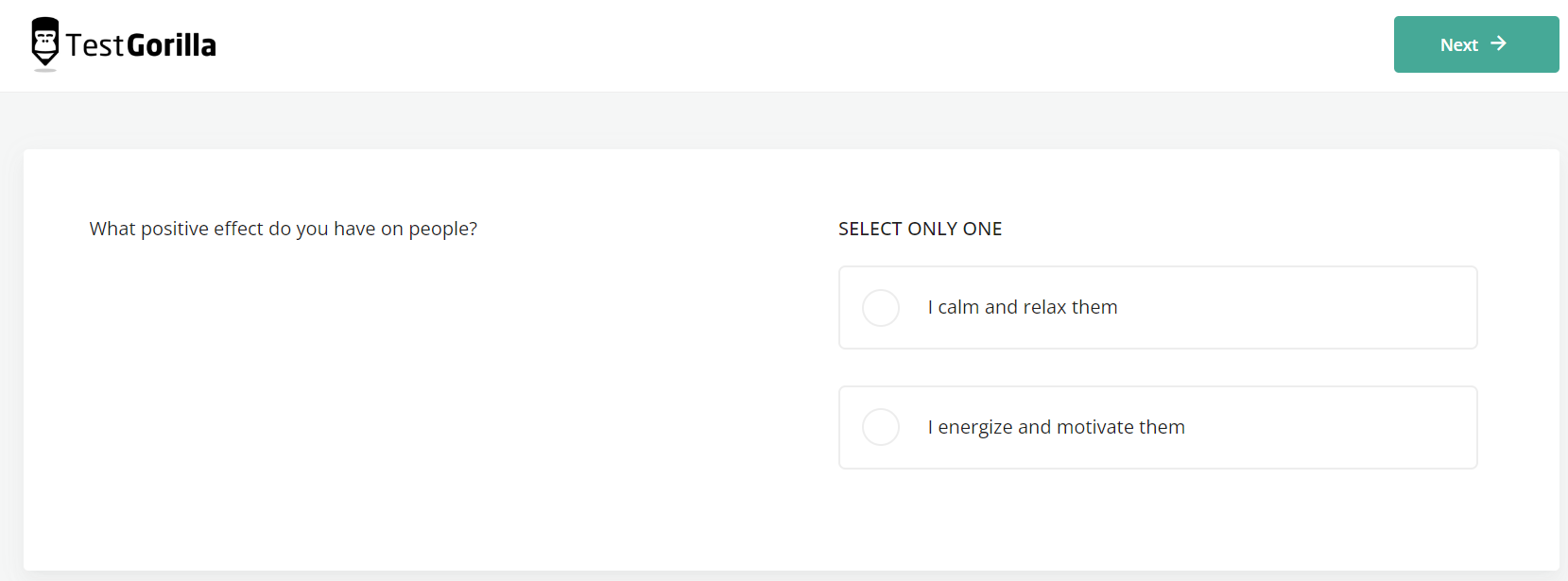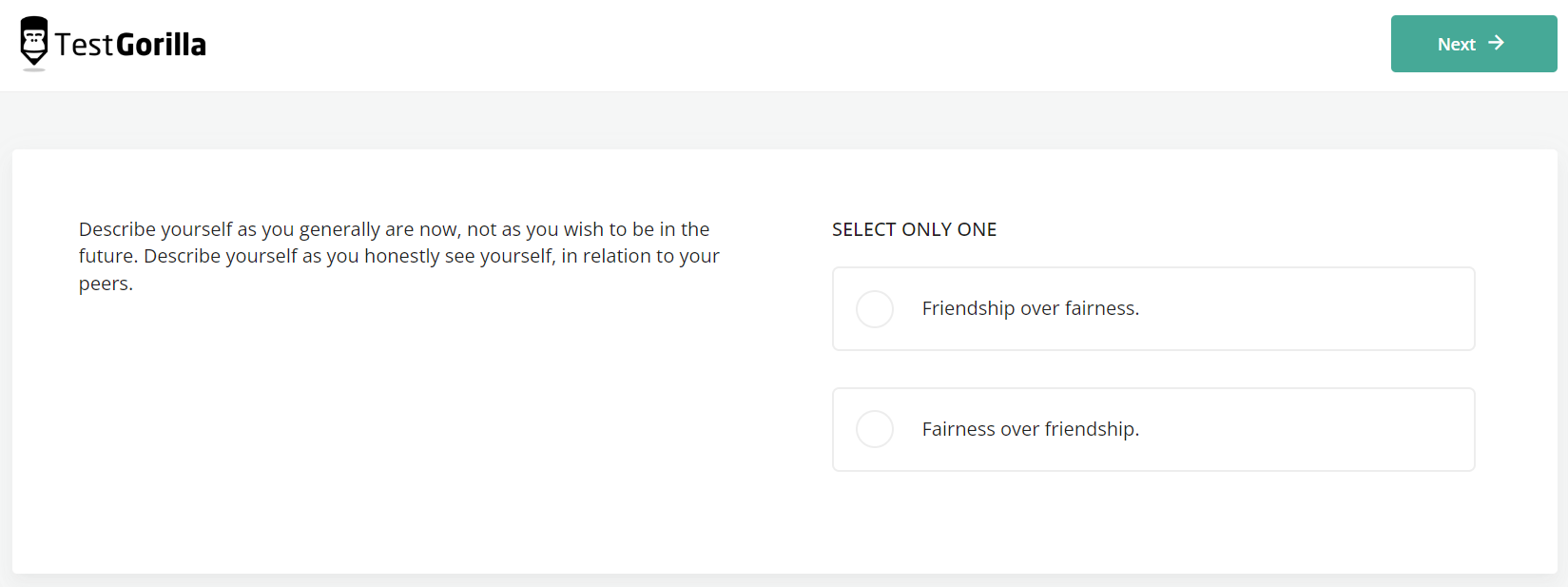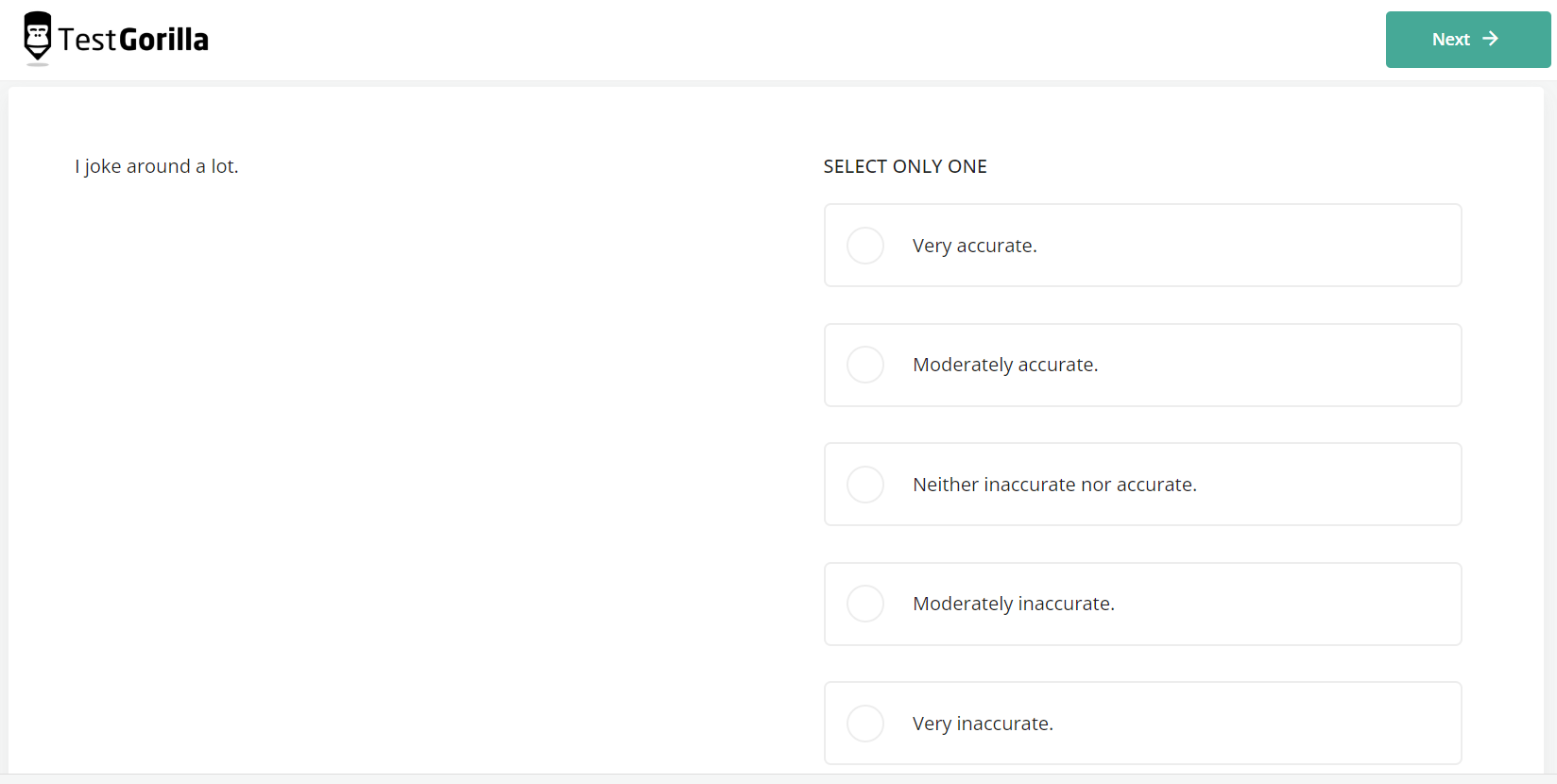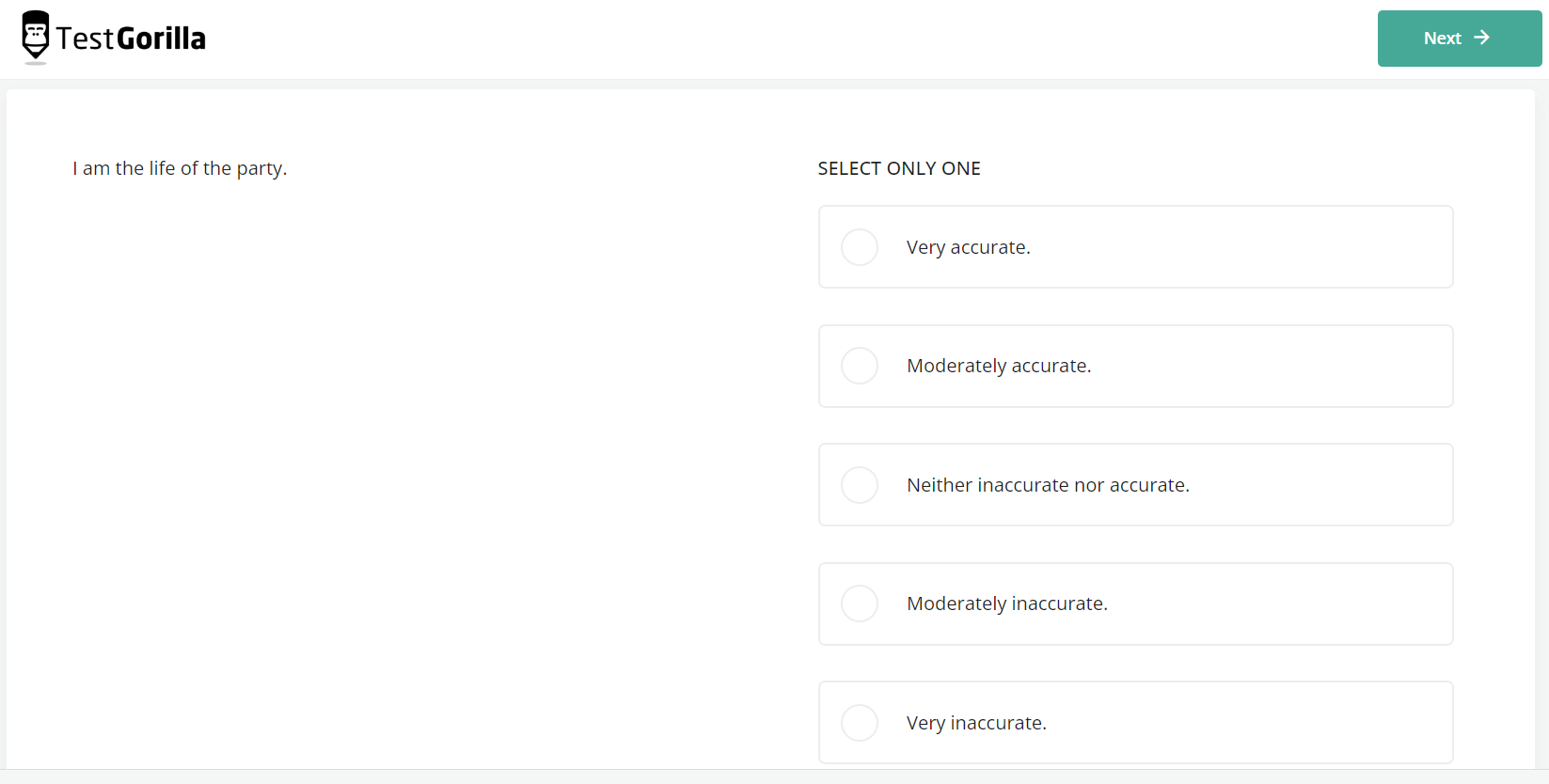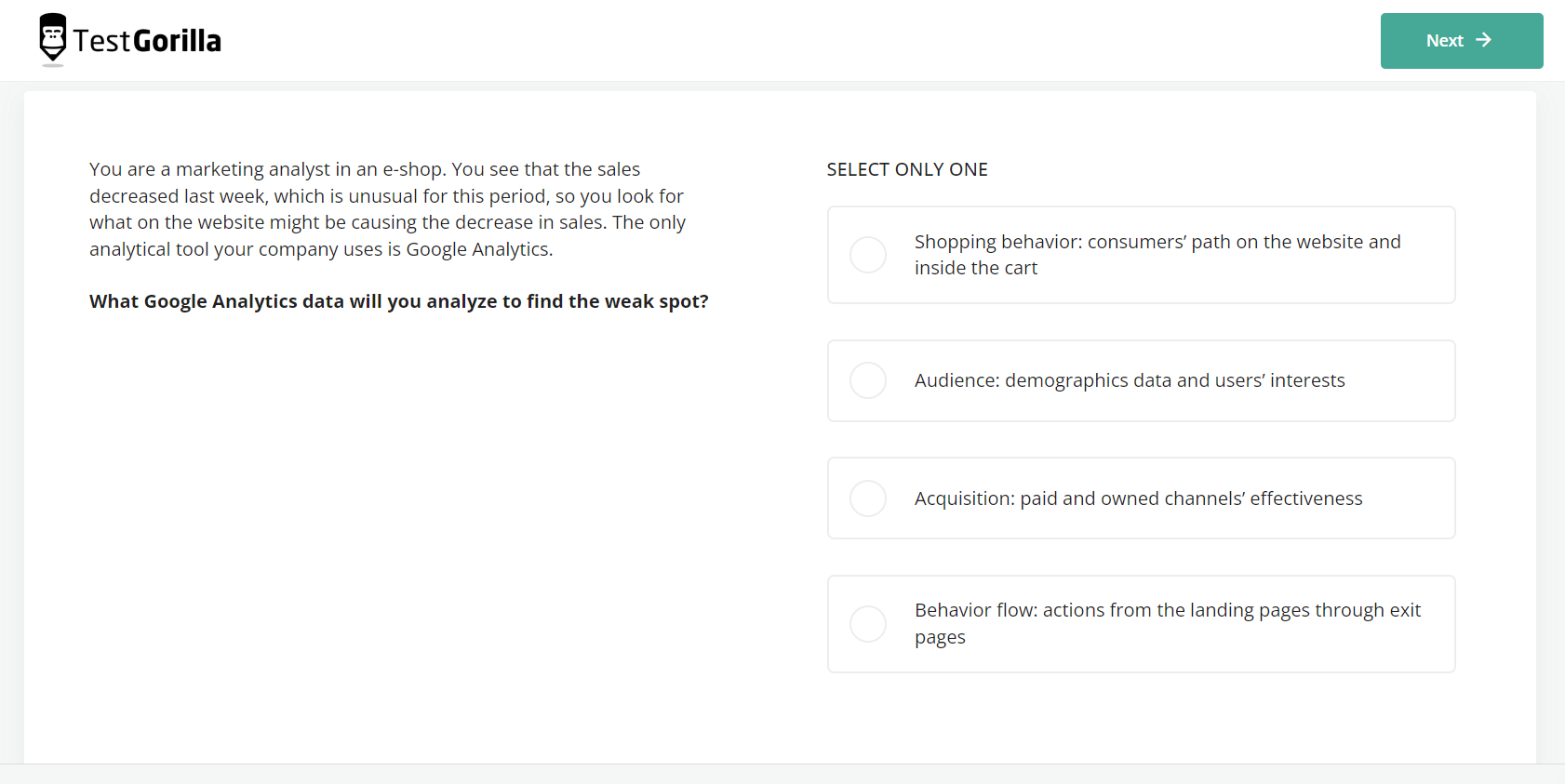Employees who don’t work well together can hinder your organization’s productivity and culture. That’s why it’s essential to consider a candidate’s personality and how they can mesh with your team before hiring them.
Personality tests offer an easy way to get detailed insights into an applicant’s qualities, motivations, emotional intelligence, and traits. If you don’t evaluate a candidate’s personality, you risk potential workplace conflicts and decreased team morale.
In this article, we discuss the benefits and drawbacks of workplace personality tests, compare the best options, and explain how to find the best personality test for your needs.
Table of contents
Why are personality tests in the workplace useful?
Using personality tests in the workplace helps you understand the strengths, weaknesses, and behaviors of your candidates and employees. These insights shed light on how people approach tasks, which enables you to determine how to support their productivity and motivation.
Hiring individuals whose personalities align with your company’s culture leads to better collaboration and communication styles, which are important for the success of your business. More than 70% of business leaders think effective communication benefits their team’s productivity.
Personality testing at the workplace also enables your managers to gain the competency needed to adapt their management style to your employees’ needs. The results help you understand whether to take a more hands-on management approach or if your candidate works better independently.
The best personality assessment tools support creating personalized training programs by understanding individual learning styles and feedback preferences.
Lastly, personality tests in the workplace can identify the biggest burnout triggers for employees, helping you create healthier working conditions, which is essential for keeping your workers engaged and productive.
What are the main benefits and drawbacks of work personality tests?
Although personality evaluation tools have many advantages, they also have some drawbacks. Below is a quick summary of the most important benefits and disadvantages of personality test tools.
Employee personality test benefits | Employee personality test drawbacks |
- Align candidate profiles with team culture - Support integration of new hires - Improve communication and collaboration - Optimize team dynamics - Support the creation of personalized training programs - Cultivate a supportive workplace atmosphere - Ensure person-organization fit, which supports employee engagement and productivity | - Potential for misuse or over-reliance - Could be biased against certain groups if not combined with other hiring methods - Not customizable or applicable to every role - Some candidates can try to cheat or not answer truthfully to present themselves in a better light |
The 7 best personality tests for workplaces
Here are the best personality tests for workplaces that can help you find better candidates.
These tools offer valuable insights into candidates’ behaviors, preferences, and culture add, which supports objective hiring decisions, unlike culture fit.
The summary of best workplace personality tests
Personality evaluation tool | Description |
1. 16 Types Personality test | Assesses how individuals engage with their environment and make decisions, offering insights into professional behaviors |
2. Enneagram test | Provides a deep understanding of candidates' core beliefs and how they handle challenging situations |
3. DISC Personality test | Evaluates personality traits and behavior in different situations |
4. Big 5 Personality test | Measures five personality dimensions to offer insights into behavioral patterns that influence workplace interactions |
5. Motivation test | Assesses how candidates’ internal motivators and job preferences align with a role, supporting informed hiring decisions |
6. Culture Add test | Measures applicants’ potential to contribute to organizational values and culture, which is crucial for innovation |
7. CliftonStrengths assessment | Reveals unique talents across 34 themes, offering strategies for effective talent use in the workplace |
1. 16 Types Personality test
The 16 Types Personality test gives insights into how individuals engage with their environment, process information, make decisions, and organize their lives. It’s based on the Myers-Briggs type indicator. This test, most commonly known by its acronym, MBTI, was co-created by Isabel Briggs Myers.
This personality test for work contains 36 questions and lasts 10 minutes, so it doesn’t take too much of your candidate’s time. Participants answer self-assessment questions that examine their tendencies across four dimensions.
For example, your candidates answer questions like this one:
Each question evaluates which end of the spectrum candidates lean more toward. For example, introversion versus extroversion or judging versus perceiving.
The result gives a four-letter code that provides more insight into a person’s likes and dislikes, aspirations and fears, or abilities and challenges.
Each letter represents a certain personality trait or preference:
E: Extraversion
F: Feeling
I: Introversion
J: Judgment
N: Intuition
P: Perception
S: Sensing
T: Thinking
Candidates fall into one of 16 personality types in the workplace based on their answers. The detailed report covers various aspects of each personality type, including work style, teamwork, potential growth, and relationship-building abilities.
For example, a candidate can be classified as ENFP, which means they are extroverted, intuitive, feeling, and perceiving. ENFP personality is well-suited for roles that require interpersonal skills and innovation, such as marketing, counseling, or teaching positions.
2. Enneagram Personality test
The Enneagram Personality test provides a better understanding of your candidates’ core beliefs and how they manage challenging situations in the work environment.
This personality test for employment categorizes personalities into nine types – i.e., Enthusiasts, Loyalists, Helpers, and Challengers – each represented on a nine-pointed diagram called an enneagram.
The test includes questions that evaluate how individuals react to stress and opportunity, interpret the world, and behave in various situations.
Here’s an example:
The results provide a comprehensive analysis of each personality type’s strengths and potential areas for growth. You can use these insights to hire candidates whose personalities align with their future roles.
For example, if hiring a new project manager, use this test to find someone who can lead the team, develop innovative solutions, and perform under pressure. A candidate with an Enneagram Type 3 personality (go-getter or high achiever) can excel in the role due to their inherent motivation, efficiency, and adaptability.
A great thing about our Enneagram test is that it suggests additional interview questions you can use to dig deeper into how your candidates operate.
If you want to use TestGorilla’s personality tests for existing employees or candidates, book a live demo to learn more.
3. DISC Personality test
The DISC Personality test helps employers learn more about their employees to improve interpersonal workplace relations, communication, and teamwork.
The personality inventory assesses how individuals behave in different situations, which provides important insights into traits that influence their decision-making, collaboration, and communication dynamics. That’s why it is one of the best personality tests for team building.
The DISC model includes four primary behavioral types:
Dominance (D): Individuals with high “D” scores are assertive, rational, result-oriented, and embrace challenges. They are decisive and use a direct approach to problem-solving.
Influence (I): Those who score high are sociable, persuasive, and enthusiastic. They excel in situations that require collaboration and effective communication.
Steadiness (S): People with a steadiness preference are dependable, calm, and supportive. They value consistency and thrive in a collaborative and stable environment.
Conscientiousness (C): Candidates with high “C” scores are detail-oriented and analytical, have self-awareness, and prioritize accuracy. They approach tasks systematically and can ensure quality and compliance.
The DISC assessment engages test takers in a self-evaluation exercise consisting of 48 statements. Respondents rate each statement on a scale from 1 (very inaccurate) to 5 (very accurate), reflecting their agreement with each statement.
Candidates fall into 12 main personality types with a detailed report that discusses strengths and weaknesses. These insights can help you tailor better workplace communication strategies.
For example, a team leader with a “DC” personality type, known for being questioning and analytical, collaborates with “SI” team members who value team cohesion and support.
Although the team leader wants to push for results and efficiency, recognizing their team’s need for a supportive environment makes them incorporate more team-building activities and feedback sessions. This approach balances task focus and team cohesion, improving team morale.
If you want to see more questions from this personality test for work, check out the DISC Personality test preview.
4. Big 5 Personality test
The Big 5 Personality test evaluates five broad dimensions of personality to provide valuable insights into individual behavioral patterns.
These five key dimensions are:
Openness: Evaluates intellectual curiosity, creativity, and a preference for new experiences. It ranges from highly inventive and curious to more consistent and cautious.
Conscientiousness: Reflects reliability, organization, and diligence. Individuals can fall anywhere from being efficient and organized to being more extravagant and careless.
Extraversion: Measures sociability, energy, and the tendency to seek the company of others, contrasting outgoing and energetic individuals with those who are more solitary and reserved.
Agreeableness: Assesses the extent of a person’s compassion and cooperativeness versus a more competitive and sometimes challenging demeanor.
Neuroticism: Evaluates the tendency towards emotional instability and anxiety, contrasting sensitive and nervous individuals with those who are more resilient and confident.
The Big 5 Personality test requires candidates to rate themselves on a series of statements, using a scale from 1 (not at all like me) to 5 (very much like me).
The next step is to learn how to interpret the test results of a Big 5 (OCEAN) assessment.
The results offer a detailed view of a candidate’s personality, showing how their unique traits can influence team dynamics and workplace interactions. These insights are crucial for shaping development initiatives for workers’ career paths, improving team collaboration, and refining leadership approaches.
For example, a highly conscientious team member can be in charge of leading a project. Their strong organizational skills and attention to detail ensure the project stays on track.
If they struggle with flexibility when unexpected challenges arise, the manager can pair them with a team member who is highly open and uses creative problem-solving and adaptability. This approach supports team collaboration and leads to a better project outcome.
The great thing about our Big 5 Personality test is that you can use it for 100% free. All you have to do is sign up for a TestGorilla account!
5. Motivation test
The Motivation test measures how a candidate’s preferences and internal motivators align with the role. The employer fills out the survey for a specific job offer, and then a candidate takes the employment personality test to see if they are a good match.
The test measures motivation by evaluating factors such as finding work meaningful, having a sense of responsibility for the outcomes, and understanding the impact of work. It consists of a questionnaire with 20 questions that candidates should answer in less than 15 minutes.
This workplace personality test also considers factors that contribute to overall job satisfaction, such as job benefits and preferred work activities.
The Motivation test identifies candidates whose preferences and motivators resonate with the role’s demands, which supports informed hiring decisions.
For example, a good candidate for the accountant position should be motivated by the opportunities to use their expertise in financial analysis and reporting, the clear impact of their work on the organization’s fiscal health, and their role’s stability.
6. Culture Add test
The Culture Add test assesses how well a candidate’s values and behaviors align with those of your organization, which is important because 35% of people would turn down a dream job if they don’t like the company culture.
The test evaluates whether candidates can contribute to the existing organizational culture and its evolution to support innovation, effective decision-making, employee engagement, and attracting top talent.
Before administering this personality test for employment, you rate values and behaviors based on their importance to the company's culture and the specific role. Candidates receive a similar test in which they select the values and behaviors that resonate most with them.
The results offer insights into each applicant’s alignment with your organizational values and the specific behaviors required for the role. This cultural compatibility is crucial for job performance and retention.
7. CliftonStrengths assessment
The CliftonStrengths assessment, formerly StrengthsFinder, uncovers unique talents across 34 themes, providing a deep understanding of people’s natural talents.
This 30-minute online test requires respondents to choose between paired statements that best reflect their preferences, way of thinking, and behaviors.
The insights from the assessment encourage focusing on strengths rather than fixating on weaknesses, which is important for greater success and engagement in work and life.
Customized reports, including role-specific options, offer actionable strategies for effectively using your candidate's strengths in various work aspects.
That can give you ideas about where employees’ talents can be the most useful, which is valuable if they are looking for a new challenge. There’s a good chance they are because reports show that 46% of employees dislike the overall experience at their organization.
How should you use workplace personality tests?
Personality testing at the workplace helps you discover the diverse behavioral styles and preferences of current and potential employees.
These assessments can enhance team dynamics, improve communication, and boost overall productivity when used effectively. For example, Contentoo uses personality tests to quickly fill its sales and customer success teams with candidates motivated to show their value to the company.
Here are six strategies for incorporating employee personality profile tests into your workplace:
1. Integrate personality tests for work early in the selection process
We recommend using personality tests early in the hiring process, ideally before the interview stage.
There are two main reasons for this:
A personality test for employment can eliminate candidates whose unique personality doesn’t align well with your needs, reducing your time to hire
You can use the results to create personalized interview questions and discover more about your candidates’ approaches to the role
2. Choose the best personality assessment tools
Not all personality test tools are created equal, so it’s important to pick the best one to get consistent and objective results.
The three best options are:
TestGorilla: Provides a comprehensive assessment that combines work personality tests with skill evaluations, making it ideal for a holistic view of candidates
Pulsifi: Measures how well a new hire can integrate with the team, which supports team cohesion
Plum: Focuses on personal and professional development by identifying key motivators and areas for growth, which is great if you’re looking for personality tests for team building
We can confidently say we’re the best choice for your hiring needs because 92% of companies using our talent assessments see a reduction in mis-hires.
3. Complement the best personality test for the workplace with skills assessments
Basing a hiring decision solely on the results of a work personality test can lead to a mis-hire.
Although personality assessment tools provide valuable information about the person-organization fit of your candidates, they are only a piece of the puzzle.
Another important factor is whether applicants possess the hard and soft skills to thrive in the role. You can also test those skills with our talent assessments.
For example, if you’re hiring a digital marketing analyst, you can use our Marketing Analytics test to find top talent.
4. Take advantage of customization options
You can customize many personality evaluation tools to fit your specific needs. That’s why you must ensure the traits assessed are relevant to the job’s requirements and the company culture.
For example, if you are hiring for a customer service role, you can customize a workplace personality test to focus on traits like empathy, patience, and communication skills because they are essential for the role.
5. Investigate team dynamics
You can use personality tests for team building to map out the existing team dynamics and identify areas of strength and potential conflict.
Considering that 85% of workers experience some type of workplace conflict, which leads to more stress, anxiety, lack of productivity, and disengagement, it’s important to mitigate it at all costs.
The insights from personality tests for existing employees can guide team formation and development activities, creating a more cohesive and supportive work environment.
6. Create development programs
Use the insights from personality testing at the workplace to design customized development programs. According to 37% of workers, employers must present more opportunities for growth to create a better work environment.
Identify the workers who want to learn new things and design development programs to help them build their skills and confidence. This strategy can help improve employee engagement, satisfaction, and retention.
Use TestGorilla’s best personality tests for the workplace
Assessing your candidates can be challenging, but workplace personality tests are a great way to see how they align with your company’s values and hiring needs.
However, combining these tests with other types of talent assessments is important for a comprehensive view of each candidate’s skills and traits.
Book a live demo to learn how to use TestGorilla’s personality tools in combination with other tests to create effective multi-measure assessments.
You can also take a product tour to discover our platforms’ functionalities and customization options.
However, the best way to truly experience the potential of our tests is to sign up for a free account and use our Big 5 Personality and Motivation tests.
Best personality assessment FAQs
Do you still have questions about the best workplace personality tests? Find your answers below.
What is an employment personality test?
An employment personality test is an appraisal of a candidate’s behavioral styles, interpersonal dynamics, and work preferences. Employers use these assessments to determine how well an individual can integrate with an existing team, align with company values, and contribute to the workplace environment. The goal is to find someone who can thrive in the role and support organizational success.
What is the most common personality type?
The most common personality type is ISFJ, which stands for introversion, sensing, feeling, and judging. According to the Myers and Briggs Foundation, 13.8% of US adults fall into this category. This type is also known as the “defender.” It possesses qualities such as kindness, reliability, and practicality, with a strong sense of duty and a keen attention to detail.
What is the best personality test for workplaces?
Culture Add test
16 Types Personality test
Enneagram test
DISC Personality test
Big 5 Personality test
Motivation test
CliftonStrengths assessment
Jung Typology Test
Truity Personality Test
Keirsey Temperament Sorter (with artisan, guardian, idealist, and rationalist temperaments)
Do employers use the Myers-Briggs personality test?
Some employers use Myers-Briggs personality tests to learn more about their employees. You can use our 16 Personality Types test, inspired by the Myers-Briggs Type Indicator, for a more tailored approach. It better explains each person’s workplace behaviors, preferences, and compatibility with team dynamics, which helps create a more productive and cohesive workplace.
What is the Big Five personality test for employees?
The Big Five Personality test for employees is a workplace personality test that evaluates workers across five broad dimensions: openness, conscientiousness, extraversion, agreeableness, and neuroticism. The results of this workplace personality test provide insights into how a candidate behaves at work, interacts with colleagues, approaches tasks, and adapts to the organizational culture.
Related posts
Hire the best candidates with TestGorilla
Create pre-employment assessments in minutes to screen candidates, save time, and hire the best talent.
Latest posts
The best advice in pre-employment testing, in your inbox.
No spam. Unsubscribe at any time.

Hire the best. No bias. No stress.
Our screening tests identify the best candidates and make your hiring decisions faster, easier, and bias-free.
Free resources
This checklist covers key features you should look for when choosing a skills testing platform
This resource will help you develop an onboarding checklist for new hires.
How to assess your candidates' attention to detail.
Learn how to get human resources certified through HRCI or SHRM.
Learn how you can improve the level of talent at your company.
Learn how CapitalT reduced hiring bias with online skills assessments.
Learn how to make the resume process more efficient and more effective.
Improve your hiring strategy with these 7 critical recruitment metrics.
Learn how Sukhi decreased time spent reviewing resumes by 83%!
Hire more efficiently with these hacks that 99% of recruiters aren't using.
Make a business case for diversity and inclusion initiatives with this data.

